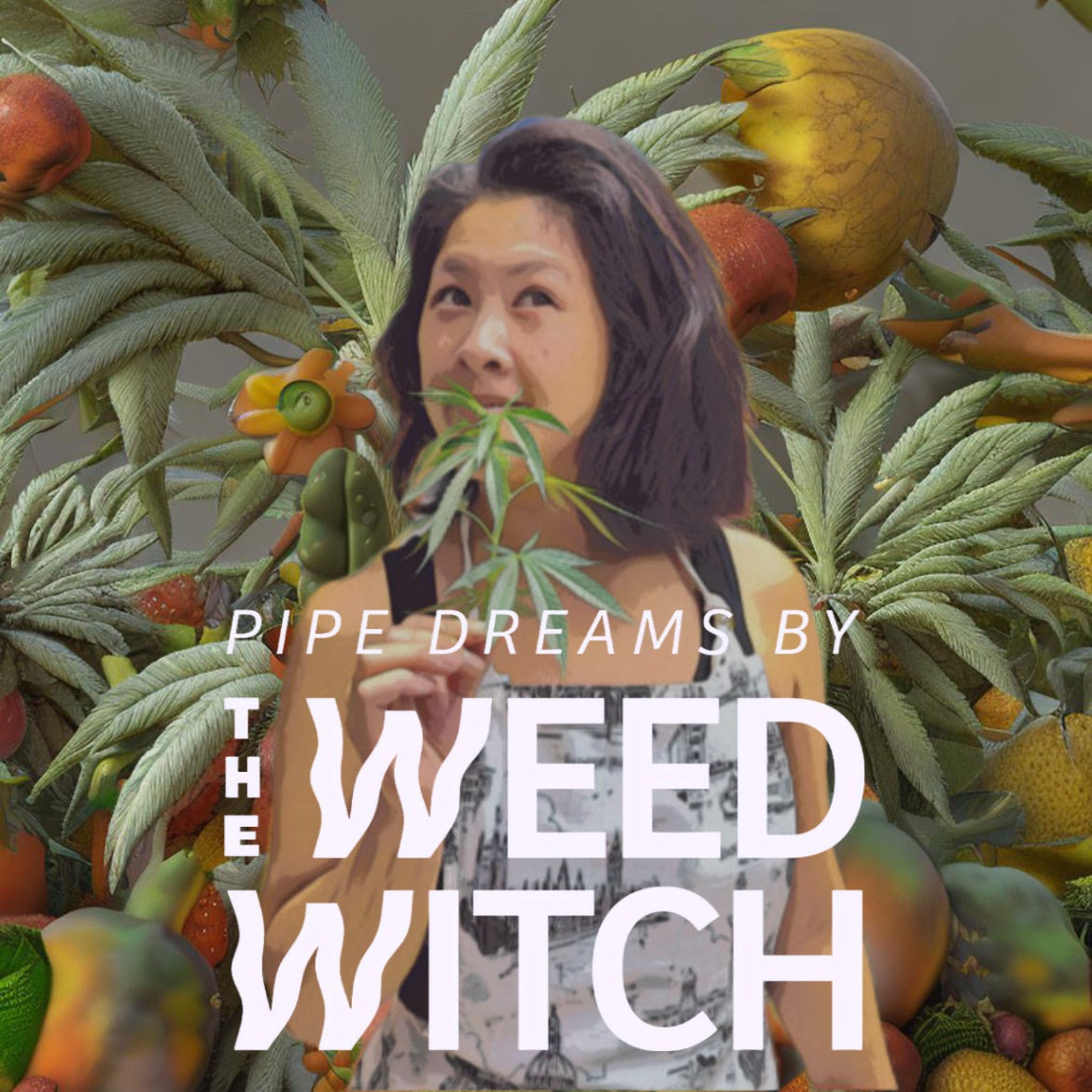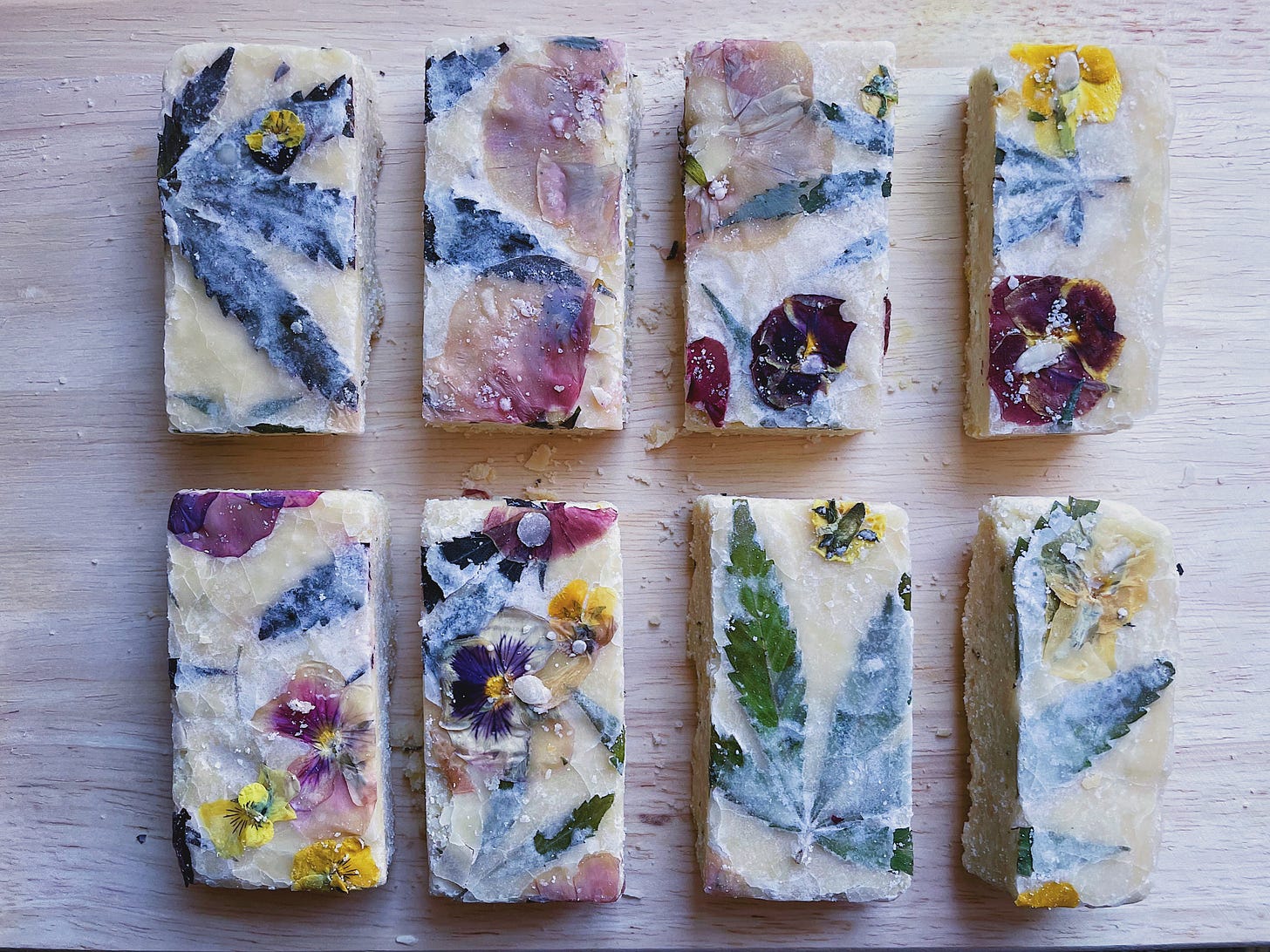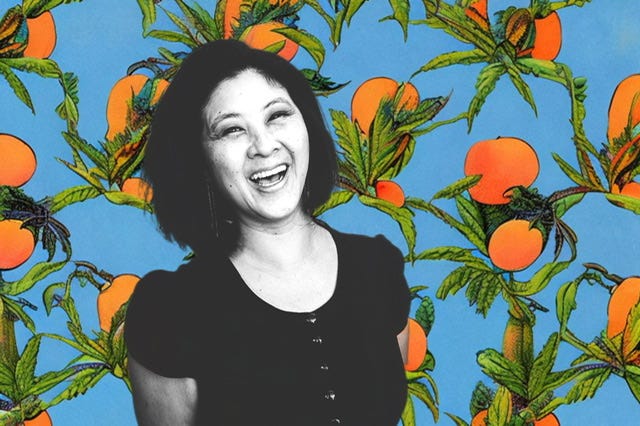OK, So You Want To Become a Weed Chef
Making the career leap from hospitality into cannabis edibles with Christina Wong
About a week ago, a care package showed up in the mail containing the most stunning brick of lemony shortbread bars, each studded with a colorful bouquet of sugar pasted edible flowers and hemp leaves that look like they were torn straight out of the pages of Real Simple—but with a certain magical ingredient.
Cannabis, she said with a faint whisper.
I instantly recognized the Botanical Bandit Shortbread Bars as the work of Christina Wong, an L.A.-based award-winning storyteller, seasoned PR and communications pro, writer, and culinary cannabis content creator (say that five times fast!) who has spent over a decade working with well-known chefs, restaurants, hospitality, and cannabis brands. Not only were they featured in her recent spread in High Times, but they also made a cameo on Fruit+Flower Unfurled, her popular Instagram and newsletter where she showcases gorgeous edibles and other elevated ideas for fans of the high life that are completely devoid of pretension.
Bookmarking the recipe, at no point did I imagine that I’d actually get to try them. And yet, here they were. Mine. All mine. What a blessing.
Among the extremely small coterie of cannabis food writers, Christina has been on my algorithm since we connected last fall at the Luxury Meets Cannabis Conference in New York City. A veteran of the farm-to-fork world, she was Director of Communications at Tender Greens and helped expand the brand to New York City before moving into cannabis as the Director of Communications at Papa & Barkley, the parent company of edibles brands P&B Kitchen and Papa’s Select.
Today, she is a partner and recipe editor of The Clever Root, a digital publication about culinary cannabis, drinks, hospitality, and everything that grows. She also co-hosts Mogu Magu, an AAPI culture, food, and cannabis collective and is a member of the HiVi Higher-Ups community, an inclusive community of cannabis advocates and activists, as well as Depressed Cake Shop, a non-profit organization that raises awareness for mental health through baking.
In many ways, she embodies the ideal eco-system for both industries: filled with creative individuals who value craft, quality, flavor, ethics, and hospitality. She possesses a certain curiosity about terpenes and techniques with the mindset that could only come from someone who has really spent a considerable amount of time in the kitchen. Years beyond the humble pot brownie, these are the evolving conversations that need to be had and the basis of my former Baked To Perfection column: challenging professional chefs to make cannabis edibles on par with what you’d expect from a restaurant.
Using the same analogies and terms sparked by the farm-to-fork movement that uplifted the mass interest in sustainable, local and organic agriculture, she’s an expert at cutting through the complex scientific, bureaucratic, and referential “weedspeak” dominating the conversation to help consumers lean into the culture and make educated purchasing decisions.
“If you know about food, if you care about where it comes from, if you shop at Whole Foods, if you buy organic, you go to your local farmers market, you eat in season, then you should learn how to appreciate and love your cannabis in the same way so that you can choose better products that align with your food values.” —Christina Wong
Creators like Christina, Wendy Zeng, Rachel Burkons of Altered Plates Hospitality, Topher Jacobs of the Hawaiian Alchemist, Jamie Evans of The Herb Somm, and Dope Kitchen have built their cannabis edibles brand presence on Instagram with quirky, fun, educational, and inspiring photos and videos for people who love the lifestyle, want to give it a chance, or are ready to welcome back friends into their homes again with something a little nicer than hitting a bong on your friend’s couch (not that there’s anything inherently wrong with that). For those who wouldn’t dare show up to a party with a shitty wine or love a good D.I.Y. project, this is the kind of lifestyle content that’s been missing from cannabis culture.
Still, platforms like Instagram and TikTok remain a blessing and a curse for content creators like her. While these platforms have supported countless food and alcohol creators to develop huge, profitable marketing arms, the social media giants are far less-friendly to cannabis content creators than Twitter or LinkedIn. It’s no secret that The Weed Witch was erased from Instagram last fall and unable to recover the account. Using the hashtag #weedwitch or any derivative of cannabis will almost certainly get flagged, shadowbanned, or potentially kicked off the app. As a result, many creators have back-up accounts, refer to the plant as *catnip* or use emojis.
At the same time, these challenges have only pushed her creativity and connections within the community.
“They’re so delicious. It’s such a fun experience, too,” she says. “I think that cannabis is so beneficial in so many ways that I want to encourage more people to be open, be curious, and experiment.”
On the latest Pipe Dreams podcast, Christina discusses how she crafted her career from corporate restaurants to content creator, the trials and tribulations of consumption lounges and third spaces, how cannabis is bringing together AAPI community to overcome cultural stigmas and strengthen family ties, the time she accidentally consumed a quad dose (70mg), and an introduction to a lowkey OG: Chinese hemp goddess, Magu.
Listen, like and share the episode. Follow Christina on Instagram and subscribe to her newsletter, and make sure to follow The Weed Witch for all of the latest and greatest. Have someone in mind that you think should be on the show? Drop a line at itstheweedwitch@gmail.com.
Welcome to the The Weed Witch coven. If you liked this post, click the heart button below and consider upgrading to a paid subscription. Fall down the wrong rabbit hole? Click here to unsubscribe.








